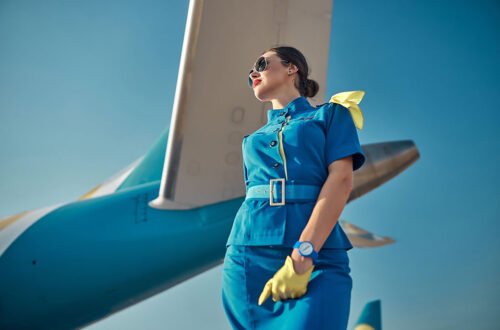When we think about air hostesses and flight stewards, we often picture their smart uniforms, warm smiles, and calm behavior during flights. But the reality is far more complex. Their job goes far beyond serving food and welcoming passengers. Air hostesses are trained professionals who are responsible for safety, emergency management, and ensuring a pleasant flying experience for everyone on board.
For those dreaming of joining this dynamic profession, choosing the right training program is essential. Enrolling in an Air Hostess/ Flight Steward Course in Udaipur offers in-depth knowledge, real-time training, and industry exposure needed to succeed in this field.
The Safety Role of an Air Hostess
One of the most important responsibilities of an air hostess is to ensure passenger safety. Before every flight takes off, the cabin crew conducts safety checks. This includes making sure all equipment like life jackets, oxygen masks, and emergency doors are functioning properly. They also brief passengers about safety instructions and demonstrate how to use emergency equipment.
In the event of turbulence, technical issues, or emergency landings, air hostesses must act quickly and confidently. Their training prepares them to manage panic, assist with evacuation, and offer first aid when necessary. Safety isn’t just a part of the job; it is the most critical task they perform every day.
Managing In-Flight Services with Precision
An air hostess also ensures that all passengers are comfortable throughout the flight. This includes distributing meals and beverages, handling special requests, and providing assistance to the elderly, children, or people with disabilities. They are trained to stay patient and calm in all situations, even when passengers are upset or uncomfortable.
In addition, flight attendants must manage time well. They have to complete various tasks within limited timeframes while maintaining excellent service quality. This requires discipline, communication skills, and strong multitasking abilities.
Effective Communication is Key
Air hostesses act as a bridge between the cockpit crew and the passengers. They receive instructions from pilots and relay them clearly and calmly to everyone on board. Whether it’s a minor delay or an emergency announcement, their ability to communicate effectively helps in managing passenger expectations and emotions.
They must also be multilingual or possess a good command of English and the local language, as flights usually carry people from different regions and countries. Clear communication helps prevent misunderstandings and ensures a smooth flying experience.
Conflict Resolution and Passenger Support
Not all flights are smooth—some passengers might get angry, anxious, or disruptive. One of the lesser-known but essential skills of an air hostess is conflict resolution. They are trained to manage difficult situations tactfully and diplomatically. This includes resolving seating disputes, calming anxious flyers, and handling complaints with professionalism.
Their ability to diffuse tense situations can directly impact the safety and comfort of all passengers. That’s why emotional intelligence, patience, and empathy are highly valued in this career.
Emergency Preparedness: More Than Just Drills
Air hostesses undergo extensive emergency training, which includes how to respond during hijackings, fire breakouts, water landings, and sudden medical issues. They must be alert and mentally prepared to take quick actions that can save lives.
Emergency drills are a regular part of their training and involve real-life simulations. This helps build muscle memory and confidence so they can act without hesitation when real challenges arise.
Keeping Aircraft Cabins Secure and Hygienic
Cleanliness and hygiene are now more important than ever, especially post-pandemic. Cabin crew ensures that aircraft cabins remain clean and well-sanitized. They also check that lavatories are well-stocked and clean throughout the flight.
They are responsible for checking seatbelts, tray tables, and overhead bins to maintain cabin order. A tidy cabin creates a comfortable atmosphere and reflects the professionalism of the airline.
Continuous Learning and Professional Growth
Being an air hostess is not a one-time training job. It requires constant learning. New airline policies, customer service standards, safety regulations, and aircraft models are introduced regularly. Air hostesses must stay updated with the latest information and practices.
This is why selecting the right college plays a vital role in long-term success. Choosing an Airport Ground Staff college in Udaipur can also open up career paths for those who are interested in the aviation field but prefer ground-based roles. These institutions provide industry-relevant training and hands-on experience that builds confidence and skills in students.
A Career that Offers More Than Just Travel
While the opportunity to travel the world is a great perk, the role of an air hostess offers much more. It is a career built on discipline, commitment, and courage. Every flight comes with its own set of responsibilities and challenges, and being ready for them is what makes an air hostess truly professional.
They serve as first responders in the sky, comfort providers, and sometimes even heroes. Behind the charm and glamour lies a job that demands serious responsibility, skill, and heart.
Conclusion
The essential tasks of an air hostess go beyond the uniform. From ensuring safety and delivering top-notch service to resolving conflicts and managing emergencies, their role is both dynamic and impactful. For aspiring professionals, getting trained at a reputed institution can pave the way to a rewarding career in aviation. With the right education, strong ethics, and a passion for service, one can truly soar high in this exciting field.





